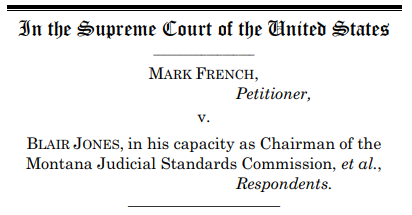In Williams-Yulee v. Florida Bar, 135 S. Ct. 1656, 1662 (2015), this Court upheld a restriction on judicial candidates’ soliciting money in person. This Court stressed that the restriction affected only “a narrow slice of speech,” id. at 1670. And this Court’s opinion did not purport to deviate from the decision in Republican Party of Minn. v. White, 536 U.S. 765, 788 (2002), which struck down a rule barring judicial candidates from announcing their views on disputed legal or political issues. Indeed, the restriction in White was struck down because it limited speech on political issues, 536 U.S. at 776, while the restriction in Williams-Yulee was upheld because it “le[ft] judicial candidates free to discuss any issue with any person at any time,” 135 S. Ct. at 1670.
Yet the court below concluded that Williams-Yulee did in fact diverge sharply from White, “mark[ing] a palpable change in the approach to state regulations of judicial-campaign speech,” and permitting broad restrictions that would have previously been seen as unconstitutional. Pet. 15a. Relying on this conclusion, the court below upheld a rule prohibiting judicial candidates from “seek[ing], accept[ing], or us[ing] endorsements from a political organization, or partisan or independent non-judicial office-holder or candidate.” Mont. Code of Judicial Conduct Rule 4.1(A)(7); Pet. 3a. In the process, the court below also suggested that Williams-Yulee marked a sharp change in how this Court treats underinclusiveness when conducting a strict scrutiny analysis—even though WilliamsYulee did not suggest any such change, and even though any such change could have vast effects on free speech cases far outside the area of judicial campaign speech.
Like the rule in White, and unlike that in WilliamsYulee, this rule restricts candidates from discussing information that is important to many voters. Many voters find party endorsements helpful because such endorsements (1) are a useful shorthand for a candidate’s position on many important issues, and (2) show that the political party finds the candidate credible. Nevertheless, the court below concluded that Williams-Yulee rendered unpersuasive these arguments—the very arguments used to invalidate similar restrictions in the “pre-Williams-Yulee world,” e.g., Sanders County Republican Central Committee v. Bullock, 698 F.3d 741, 747 (9th Cir. 2012). Pet. 13a.
Other courts have also mistakenly concluded that Williams-Yulee allows for broad restrictions on judicial candidate speech. The Sixth Circuit upheld a restriction on all judicial campaign solicitations, including by campaign committees, outside a specified time window. O’Toole v. O’Connor, 802 F.3d 783, 791 (6th Cir. 2015). The Sixth Circuit repeatedly cited Williams-Yulee for support, see id., even though the rule in Williams-Yulee was upheld in part because it did not prohibit campaign committees from soliciting contributions. Williams-Yulee, 135 S. Ct. at 1668. Similarly, the Kentucky Supreme Court upheld a rule preventing judicial candidates from acting as political party spokespeople or hosting events for a political party. Winter v. Wolnitzek, 482 S.W.3d 768, 777-78, 780-81 (Ky. 2016).
At the same time, some lower court opinions continue to read Williams-Yulee narrowly. For example, in Winter v. Wolnitzek, 834 F.3d 681, 689-91 (6th Cir. 2016), the court relied on pre-Williams-Yulee cases, including White, in invalidating a prohibition on candidates from making speeches “for or against a political organization.”
This Court should grant certiorari to clarify the effect of Williams-Yulee, reaffirm the narrowness of that decision, protect judicial campaign speech, and prevent the erosion of the longstanding strict scrutiny framework, which is critical to protecting free speech more broadly.
Read Full Brief














